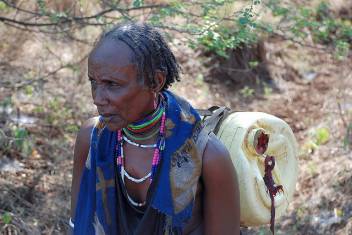 The 6th World Water Forum concluded recently in Marseille, France and generated a great deal of interest among policy makers, governments, development agencies and civil society. However, older people’s concerns about current water crises, how they are affected and their potential contributions were sidelined.
The 6th World Water Forum concluded recently in Marseille, France and generated a great deal of interest among policy makers, governments, development agencies and civil society. However, older people’s concerns about current water crises, how they are affected and their potential contributions were sidelined.
22 March is also World Water Day and another opportunity to raise awareness of people around the world who do not have access to clean water. According to the latest statistics, globally, close to a billion people are forced to live without safe drinking water and around two billion are deprived of basic sanitation.
The majority of these people live in the developing world, but mainly Sub-Saharan Africa and South Asia. A substantial part of these numbers is made up of older people living in impoverished conditions in rural areas.
Older people’s needs ignored
Water affects people’s lives in many ways; beginning with access and affordability. Other issues include how poor water quality affects health and how girls are more affected as often they are burdened with walking long distances to fetch water. On another level, lack of water can break down social harmony and even cause wars between states. Clearly, it is not an easy subject to deal with. Hence, the discussions focused on various themes.
There were at least three major topics discussed in the Forum where older people’s needs should have been discussed and the special role they play should have been recognised and included in future strategies.
Firstly, a strong focus was put on making the 2010 UN General Assembly resolution on the right to clean water and sanitation a reality. To transform this right into a reality at policy and ground levels, greater focus will need to be put on older people’s needs and their contributions.
Solutions lie in local knowledge
Secondly, there was a lot of talk on water and health as well as water quality. However, the Forum took no note of older people being one of the most vulnerable groups in this context. This is an issue that clearly needs further advocacy in future discussions on water.
Thirdly and probably most importantly, the Forum almost unanimously agreed that the solutions to the water crisis lie in local knowledge and traditional wisdom. Yet again, older people were forgotten. It is hard to understand what kind of local knowledge exists without the active contributions of older people.
With three years left to achieve the Millennium Development Goals, many believe progress has been slowest on MDG seven which focuses on environmental sustainability in the face of the increasing water crisis. Older people may have a very important role to play in realising this goal.
Contributions need to be recognised
Older people’s leadership in regions where the water crisis is at its worst may play an instrumental role in designing and implementing sustainable solutions at community levels.
Older people need water as much as others do. They can also contribute to water conservation efforts as much, if not more, than others can. This needs to be recognised.
- Read more about World Water Day
- Find out more about our work supporting older people in South Asia
